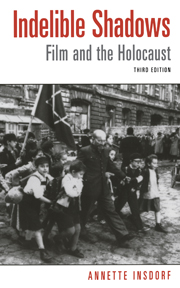Book contents
- Frontmatter
- Contents
- Foreword by Elie Wiesel
- Preface
- Introduction
- I Finding an Appropriate Language
- 1 The Hollywood Version of the Holocaust
- 2 Meaningful Montage
- 3 Styles of Tension
- 4 Black Humor
- II Narrative Strategies
- III Responses to Nazi Atrocity
- IV Shaping Reality
- V Third Edition Update
- Annotated Filmography (Third Edition)
- Filmography (Second Edition)
- Notes
- Bibliography (Second Edition)
- Bibliography (Third Edition)
- Relevant Websites
- Index
4 - Black Humor
Published online by Cambridge University Press: 14 January 2010
- Frontmatter
- Contents
- Foreword by Elie Wiesel
- Preface
- Introduction
- I Finding an Appropriate Language
- 1 The Hollywood Version of the Holocaust
- 2 Meaningful Montage
- 3 Styles of Tension
- 4 Black Humor
- II Narrative Strategies
- III Responses to Nazi Atrocity
- IV Shaping Reality
- V Third Edition Update
- Annotated Filmography (Third Edition)
- Filmography (Second Edition)
- Notes
- Bibliography (Second Edition)
- Bibliography (Third Edition)
- Relevant Websites
- Index
Summary
Comic films about the Holocaust raise two major questions: to what extent is humor appropriate when dealing with such devastation? And what illumination can a perspective of humor provide that is not possible in a serious approach? Mel Brooks's The Producers is certainly not about the Holocaust, but its protagonists are right on target when they select Nazism as the most outrageous and tasteless subject for comic or musical treatment. The aim of these producers (Zero Mostel and Gene Wilder) is to make a quick buck, but this hardly describes the situation of filmmakers who use comedy as a weapon. The type of humor exemplified by The Great Dictator, To Be or Not to Be, and Seven Beauties is of course “black” – the kind that leaves a bitter taste after the laugh.
To give Hitler, Mussolini, and other mad megalomaniacs a comic kick, Charles Chaplin wrote and directed The Great Dictator (1940). In this satire, he played both the ranting Adenoid Hynkel and the victimized little Jewish barber. There was something curiously appropriate about the little tramp impersonating the dictator, for by 1939, Hitler and Chaplin were perhaps the two most famous men in the world. The tyrant and the tramp reverse roles in The Great Dictator, permitting the eternal outsider to address the masses, and the dreaded icon to seem a buffoon. The film opens with a title that sets the rather serious tone of Chaplin's brand of comedy: “This is a story of a period between two World Wars – an interim in which Insanity cut loose, Liberty took a nose dive, and Humanity was kicked around some what.”
- Type
- Chapter
- Information
- Indelible ShadowsFilm and the Holocaust, pp. 59 - 74Publisher: Cambridge University PressPrint publication year: 2002



